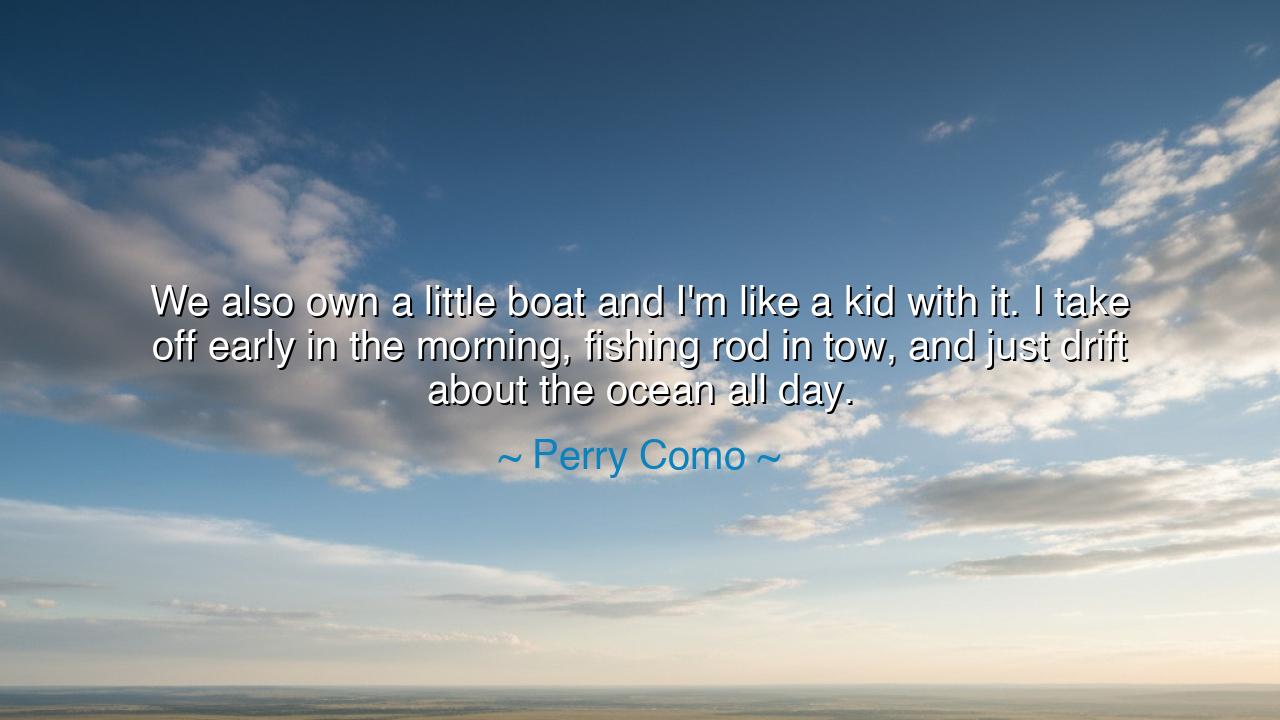
We also own a little boat and I'm like a kid with it. I take off
We also own a little boat and I'm like a kid with it. I take off early in the morning, fishing rod in tow, and just drift about the ocean all day.






When Perry Como spoke the words, “We also own a little boat and I’m like a kid with it. I take off early in the morning, fishing rod in tow, and just drift about the ocean all day,” he was not merely describing a pastime, but revealing a truth about the human spirit: that joy lies in simplicity, in returning to innocence, and in finding renewal in the embrace of nature. For one who had known the stage, the lights, and the demands of fame, the little boat became a sanctuary, a place where the world’s noise fell silent, and the soul could breathe again.
The origin of this quote rests in Como’s life as a beloved singer and performer. Though admired for his velvet voice and calm presence, he himself longed for calm beyond the glamour. The boat was more than wood and sail—it was a vessel of freedom. To rise early, to carry only a fishing rod, and to drift upon the ocean was, for him, to rediscover childlike wonder. In this, we see the eternal truth that even the great and powerful must find spaces where they can simply “be,” without performance, without duty, without weight.
History too offers us examples of this wisdom. The Roman statesman Cicero once said that he found more peace in the countryside, tending to his gardens, than in the Senate where nations were decided. Similarly, the philosopher Thoreau left society behind for a time to live beside Walden Pond, seeking the purity of solitude and simplicity. Como’s boat is a modern echo of this ancient yearning: the recognition that amidst the currents of ambition and fame, a man must also learn to drift, to surrender to stillness, and to taste the freedom of unburdened existence.
There is also something heroic in Como’s image of himself “like a kid.” For childhood is the age of wonder, where every sunrise is a marvel, every ripple in the water a story. To return to that spirit is not regression, but wisdom. The world often teaches us to abandon innocence for cynicism, but the wise man rediscovers it. To fish, to drift, to watch the horizon—these are not idle acts, but sacred rituals that restore the soul to its original joy.
This quote also whispers of the ocean as teacher. The sea is vast, eternal, unconquerable. To drift upon it is to be reminded of one’s smallness, yet also one’s belonging to something greater. Como’s mornings at sea were not only escapes, but encounters with the sublime. In drifting, he found grounding; in solitude, he found connection. Such is the paradox of nature: that in losing ourselves to it, we discover ourselves more deeply.
The lesson for us is clear: seek out your own “little boat.” It need not be made of wood or float upon water. It may be a walk in the forest, the tending of a garden, the playing of an instrument, or the quiet writing of thoughts at dawn. Whatever allows you to shed the burdens of the world and return to childlike wonder, hold fast to it. For in such practices, the soul is refreshed, and life regains its beauty.
So let us remember Perry Como’s words: “I take off early in the morning, fishing rod in tow, and just drift about the ocean all day.” Let them not remain the description of one man’s joy, but a call to us all—to rediscover simplicity, to seek wonder, and to carve out sacred spaces of rest. For it is in drifting, not striving, that we sometimes find the truest course of our lives.






AAdministratorAdministrator
Welcome, honored guests. Please leave a comment, we will respond soon